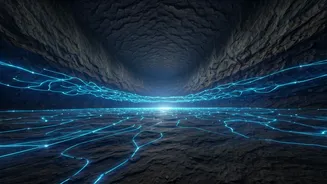Earth as a Detector
Researchers are venturing into a fascinating realm of physics, proposing to transform the Earth into a vast detection device. This strategy is not about
constructing a physical apparatus but rather exploiting the planet's inherent properties to observe elusive particles and subtle phenomena. The Earth, in this context, acts as a natural laboratory, offering an unparalleled scale and sensitivity for observing particles that interact only weakly with matter. This approach can potentially help in detecting certain kinds of extremely weak particle interactions. The advantage is clear: By using the entire planet, scientists gain an enormous volume, making the detection of rare events far more probable. This novel application takes advantage of the natural environment, utilizing it to investigate scientific questions in a new and creative manner.
Seeking Elusive Particles
The main aim of this groundbreaking method is to identify particles that are known to be difficult to detect. These particles, interacting feebly with ordinary matter, are considered to be very elusive and are believed to have only slight interactions with it. This technique hopes to capitalize on the sheer size of the Earth to greatly increase the chances of catching these particles as they pass through. The vast volume of the Earth functions as a giant net, improving the likelihood of interaction and subsequent detection, leading to new insights. Through careful analysis of signals within the Earth, scientists intend to differentiate these rare events from other ambient phenomena, ultimately allowing for a new window into the physical world. This could help uncover hidden interactions, possibly changing what is thought about particle physics.
Leveraging Earth's Signals
Scientists plan to use sophisticated analytical methods to find any subtle alterations in Earth's behavior that might be evidence of these exotic interactions. These scientists are using existing geological and geophysical data for their research. These data sets provide a large amount of information about the planet. By investigating small deviations in seismic waves, subtle changes in the Earth's magnetic field, and other naturally occurring signals, they hope to isolate the distinctive signatures of rare particle interactions. This method involves extremely precise observations and complex computational modeling. Sophisticated analysis is needed to differentiate between the potential signals produced by new physics and the noise inherent in all natural systems. Their efforts are designed to enable a deeper investigation of our universe.
Future Discoveries Await
This technique gives the possibility of discovering new particles or phenomena that have never been observed before. Because this approach is in the early stages, success is not assured. However, the potential for groundbreaking discoveries is immense. Success could not only confirm existing theories about particle physics but also introduce previously unknown fundamental forces and particles. The concept has the possibility to alter the field of fundamental physics. It would provide opportunities to explore the universe in ways previously not considered. This new approach might provide new insight into the universe's fundamental workings, which in turn could transform our understanding.
























